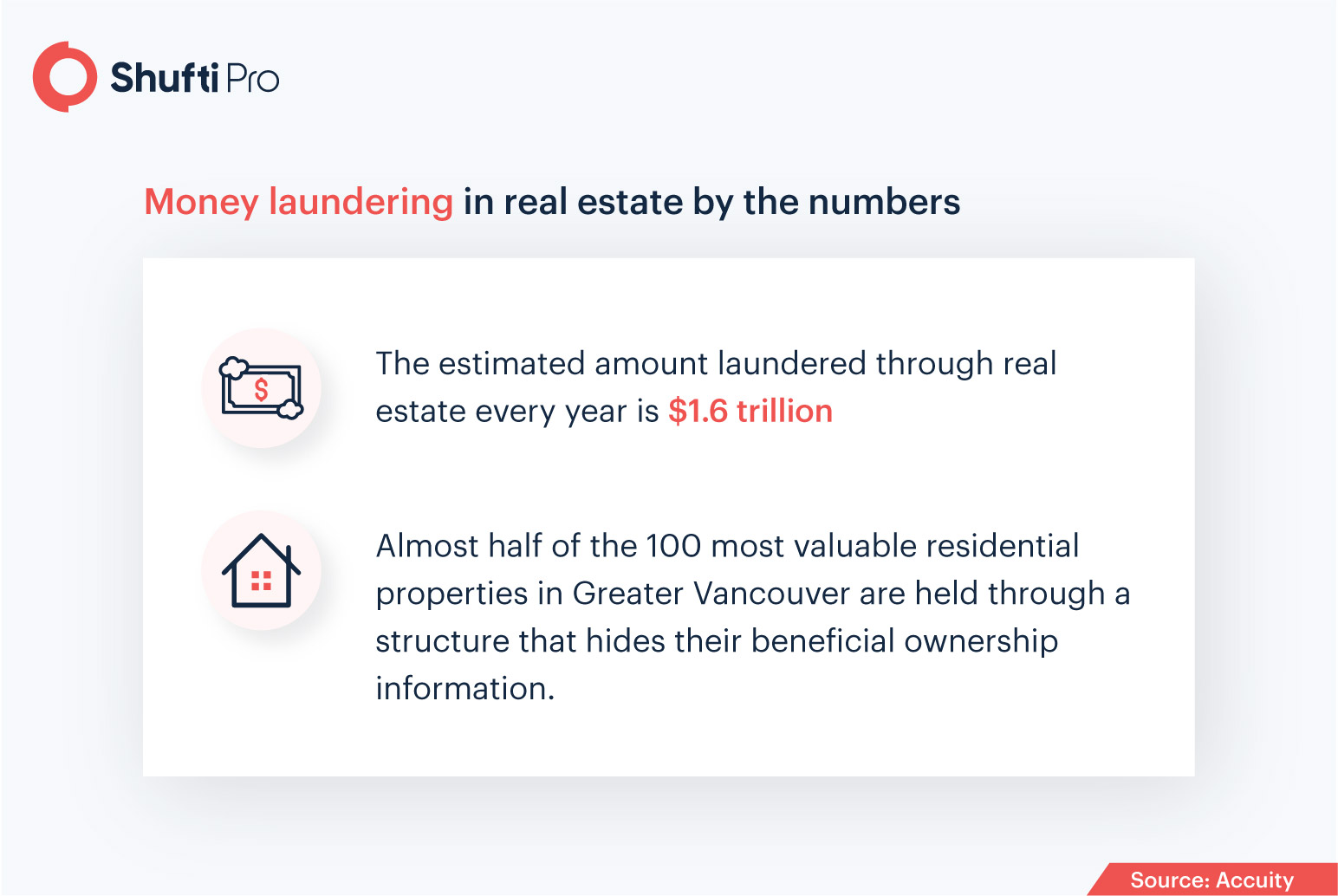Money Laundering in the Real Estate Sector – How Shufti’s AML Services Help

Purchasing luxurious mansions is always an attractive way for money launderers to legitimize their illegally obtained funds. The high inflation rates and profitability in the real estate sector collectively make for an ideal opportunity for criminals to invest large sums without having to provide proof of their money’s origin. According to a report, 59% of the real estate purchases by international clients in the US are made through cash.
Therefore, it’s not surprising that more than 650 organized criminal groups are involved in mortgage fraud leading to money laundering. The high price tags of the property enable criminals to launder millions of launders in a single purchase.
Why Real Estate is Vulnerable to Financial Crime
Unlike financial institutions and the government sector, real estate was relatively less affected by the Covid pandemic in terms of market value. However, real estate businesses continuously face problems of their own, in the form of rental scams, partnership fraud, and money laundering. A study revealed that an average amount of $1.6 trillion is laundered through real estate every year. Unless real estate dealers are themselves involved in the scam, they usually become the victimized sources of illicit financial crimes like money laundering.
The majority of real estate transactions involve cash-based dealings or loans through banks or other financial institutions. Even then, the amounts lost to crime indicate that there are significant loopholes in the system. Financial institutions are by default regulated by watchdogs like the Financial Action Task Force and FinCEN, meaning they are obliged to follow anti-money laundering and counter-terrorism financing laws at all times.
In the ideal case, a financial institution dealing in large amounts of cash is supposed to analyze the potential risks of money laundering and incorporate KYC (Know Your Customer) and Anti-Money Laundering measures. These security checks enable banks to verify their client’s identities and monitor their transactions to ensure that they do not become the source of financial crime.
Additional Risks in Real Estate
Obscuring the sources of ill-gotten funds is relatively easier when purchasing real estate, yachts, or dealing in the art market. The weak links in real estate include third-party transactions, price tags of amounts higher than the market value, and purchases by clients living in high-risk jurisdictions. Due to these reasons, real estate experiences the biggest cases of money laundering on a regular basis.
Probably the biggest loophole in the real estate sector is the widespread use of cash. Transactions in cash are the reason why a large number of illegal funds become part of the world’s economy every year. Furthermore, real estate involves smaller risk factors that originate from aspects particular to properties. For instance, price hikes resulting from house renovation, a weak ownership structure, or a single property owned by various owners that live in different countries. In order to completely eliminate money laundering from the real estate sector, all of these issues must be identified and addressed by property dealers.

Regulations to Curb Real Estate Crimes
New and updating AML regulations from financial regulators impose a basic requirement of conducting customer due diligence in real estate agencies. Property agents are obliged to verify the identities and validate the transactions of all entities involved in a deal. The Financial Action Task Force’s guidelines for preventing money laundering and tax evasion in the real estate sector clearly highlight the requirement of customer due diligence.
EU’s AMLD6
Under the EU’s 6th Anti-Money Laundering Directive, real estate businesses must ensure the implementation of Know Your Customer, Know Your Business, and Ultimate Beneficial Ownership (UBO) verification in their systems. Moreover, transaction monitoring must be a necessary countermeasure for financial crimes where large amounts of money are being transferred. Based on the sixth Anti-money laundering directive, real estate dealers could face penalties and sanctions if they fail to oblige with these requirements.
FATF’s Recommendations
The FATF’s Recommendation 22 mentions that real estate dealers, businesses, and firms that fall under the category of DNFBPs are obliged to implement Customer Due Diligence (CDD) standards as per Recommendations 10, 11, 12, 15, and 17. According to these Recommendations, real estate businesses are required to adopt a risk-based approach and carry out a detailed analysis of their client’s transaction history. The Recommendations are also applicable in the cases where DNFBPs like mortgage and lending service providers as well as notaries are involved.
FinCEN Urged to Set Up Rules for AML in Real Estate
The latest regulatory watchdog to take action against money laundering in the real estate sector is the US Treasury’s Financial Crimes Enforcement Network (FinCEN). FinCEN recently issued an Advance Notice of Proposed Rulemaking (ANPRM) to gather public feedback for Anti-Money Laundering regulations in real estate transactions. The regulatory effort which has been in the pipeline for quite some time is finally coming to life as numerous high-profile money laundering cases have been reported in the past few years.
High-risk entities that are present in the world’s infamous sanctions lists, including corrupt politicians, organized criminals, and kleptocrats opt for real estate purchases to obscure the origins of their ill-gotten funds. Recent research has revealed that over US$2.3 billion was laundered through the US real estate sector between 2015 and 2020. That’s not all, the report also showed that 82 percent of these properties were bought using money coming from foreign sources, and 50 percent were also linked to politically exposed persons (PEPs).
Money laundering through real estate also has adverse effects on the overall financial system in the US. The U.S. Strategy on Countering Corruption mentions that money laundering through real estate “negatively impacts average citizens in the United States, tilting the economic playing field against working Americans, perpetuating growth-dampening inequality, and contributing to pricing out families from homeownership through real estate purchases.”
FinCEN’s ANPRM is an effort to establish a robust regulatory framework to counter financial crimes in the real estate sector. In case the proposed points are implemented as a final rule, the loopholes and weaknesses in the US real estate sector will finally be addressed. Apart from regulations from global watchdogs, real estate businesses also need to incorporate stringent KYC compliance policies and transaction monitoring systems.
What Shufti Offers
With the significant rise in financial crimes real estate industry is becoming subject to regulatory obligations. When it comes to digital space, the challenges are increased for businesses to stay put with the AML compliance as well as fighting cybercriminals.
Shufti’s state-of-the-art Anti-Money Laundering (AML) screening services are an optimum solution for the real estate businesses as it allows them to stay compliant to regulatory standards as well as secure the company’s operations. Powered with thousands of AI algorithms Shufti’s AML screening solution also authenticates customers against 1700+ global financial watchlists in less than a second with 98.67% accuracy.
Want to learn more about AML screening solutions for the real estate sector?

 Explore Now
Explore Now













